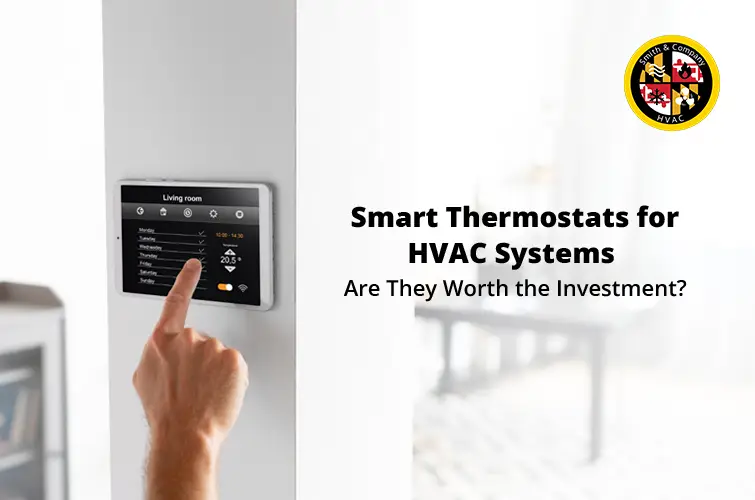
Smart thermostats are transforming the way homeowners manage heating and cooling. With rising energy costs and growing concerns about environmental impact, many wonder: Are smart thermostats worth the investment?
According to ENERGY STAR, smart thermostats can reduce energy bills by 8% annually. Additionally, the majority of U.S. homes still rely on traditional thermostats, meaning many could benefit from upgrading to smart technology.
Let’s explore how smart thermostats improve HVAC efficiency, save money, and enhance comfort.
Understanding Smart Thermostats
Smart thermostats go beyond basic temperature control. Unlike traditional thermostats, they learn user preferences, automatically adjust settings, and provide remote access via smartphone apps. Some even integrate with smart home systems like Alexa or Google Home, allowing voice control.
Key features:
- Adaptive Learning: Adjusts temperatures based on past behavior.
- Remote Control: Allows users to modify settings from anywhere.
- Energy Reports: Tracks usage and offers energy-saving recommendations.
- Geofencing Technology: Adjusts temperature when users leave or return home.
These features make smart thermostats a convenient and cost-effective solution for homeowners looking to enhance their HVAC system’s efficiency.
Energy Savings and Cost Benefits
One of the biggest advantages of a smart thermostat is energy savings. Traditional HVAC systems often run continuously, even when no one is home. Smart thermostats prevent this waste by automatically adjusting temperatures.
- Lower Utility Bills: According to the U.S. Department of Energy, homeowners can save up to 10% annually by adjusting their thermostats by 7-10 degrees Fahrenheit for eight hours per day. Smart thermostats do this automatically, eliminating human error.
- Energy Usage Insights: Many models provide real-time energy consumption data, helping homeowners track trends and adjust usage.
- Incentives & Rebates: Many energy companies offer rebates for installing smart thermostats, further reducing initial costs.
Over time, these savings make smart thermostats a worthwhile investment.
Improved HVAC System Efficiency
A well-maintained HVAC system runs more efficiently, and smart thermostats play a key role in maintenance. By preventing unnecessary strain on HVAC components, they help reduce wear and tear.
- Prevents Overuse: Many HVAC issues stem from excessive operation. Smart thermostats optimize run times, minimizing system fatigue.
- Filter Change Alerts: Some models notify users when it’s time to replace filters, ensuring peak performance.
- Integration with HVAC Maintenance Services: Smart thermostats work seamlessly with professional HVAC maintenance services, helping technicians diagnose system inefficiencies more accurately.
Convenience and Customization
Beyond energy savings, smart thermostats enhance comfort and convenience. Unlike traditional models requiring manual adjustments, smart thermostats offer automated and user-friendly features.
- Custom Scheduling: Set different temperatures for different times of the day.
- Multi-Zone Control: Manage different areas of the home individually, optimizing comfort in each space.
- Smart Home Integration: Sync with other smart home devices for a seamless experience.
- Weather Adaptation: Some thermostats adjust settings based on local weather forecasts, ensuring optimal indoor temperatures.
These customization options provide a superior level of control over home comfort.
Compatibility with HVAC Systems
Before investing in a smart thermostat, ensuring compatibility with your existing HVAC system is important. While most modern HVAC systems support smart thermostats, older units may require additional wiring or adapters.
- Check System Voltage: Most smart thermostats work with low-voltage (24V) systems, but some homes have high-voltage systems requiring special models.
- C-Wire Requirement: Many smart thermostats need a common wire (C-wire) for power. If your HVAC system lacks one, an adapter may be necessary.
- Professional Installation: While some homeowners install smart thermostats themselves, professional installation ensures proper wiring and optimal performance.
Cost Considerations: Upfront Investment vs. Long-Term Savings
While smart thermostats have numerous benefits, they come with an initial cost. Here’s what you need to know:
- Purchase Price: Prices range from $100 to $300, depending on the brand and features.
- Installation Costs: Professional installation costs between $100 and $250, depending on system complexity.
- Energy Savings: With an average annual saving of $50-$180, a smart thermostat can pay for itself in a few years.
- Rebates and Incentives: Many utility companies offer rebates for installing energy-efficient thermostats, further offsetting costs.
Smart Thermostats and Emergency HVAC Services
Smart thermostats also play a role in preventing HVAC emergencies. They provide early warnings when something is wrong, reducing the likelihood of unexpected failures.
- Temperature Anomalies: Alerts notify homeowners if temperatures rise or fall unexpectedly, helping detect system malfunctions.
- HVAC Performance Monitoring: Some models track HVAC efficiency and notify users of potential issues before they escalate.
- Remote Access During Emergencies: If an HVAC emergency occurs, users can adjust settings remotely while waiting for professional emergency HVAC services.
For homeowners prioritizing HVAC reliability, a smart thermostat is a valuable tool in preventing costly breakdowns.
Is a Smart Thermostat Right for You?
While smart thermostats offer numerous benefits, they may not be ideal for every homeowner. Here are key factors to consider before investing:
- Frequent Travel: If you’re often away from home, remote access makes smart thermostats highly beneficial.
- Home Size: Multi-zone heating and cooling can enhance efficiency in larger homes.
- Budget: While smart thermostats range from $100-$300, long-term savings often justify the initial cost.
- HVAC System Age: Older systems may require modifications for compatibility.
For those who value energy efficiency, convenience, and cost savings, upgrading to a smart thermostat is a smart decision.
Smith & Company HVAC: Your Smart Thermostat Experts

If you’re considering upgrading to a smart thermostat, Smith & Company HVAC can help. Our team provides expert installation, HVAC maintenance services, and emergency HVAC services across Maryland and Washington, D.C., to ensure your system runs efficiently.
- Smart Thermostat Installation: We assess your home’s HVAC system and install a compatible smart thermostat.
- 24/7 Emergency HVAC Services: If your system experiences issues, we offer fast, reliable emergency HVAC repairs.
- Comprehensive Maintenance Plans: Regular HVAC maintenance ensures long-term efficiency and performance.
Contact us today to schedule your smart thermostat installation or HVAC maintenance service!
